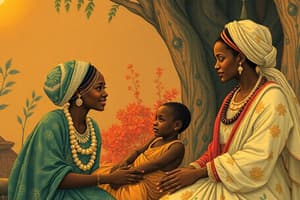Podcast
Questions and Answers
What is the primary function of the warrior groups in Yoruba society?
What is the primary function of the warrior groups in Yoruba society?
- To provide security in different Yoruba sub-communities (correct)
- To engage in inter-ethnic wars with other ethnic groups
- To show superiority and assert dominion over other ethnic groups
- To specialize in traditional artwork and sculpture
What is the prefix added to names to reflect the professional affiliation of a warrior's family?
What is the prefix added to names to reflect the professional affiliation of a warrior's family?
- Àyàn
- Olówó
- Ọdẹ
- Akin (correct)
Which of the following professions is typically associated with the prefix Ọdẹ in Yoruba names?
Which of the following professions is typically associated with the prefix Ọdẹ in Yoruba names?
- Warriors
- Hunters (correct)
- Artisans
- Drummers
What is the significance of the prefix Àyàn in Yoruba names?
What is the significance of the prefix Àyàn in Yoruba names?
Which of the following is a characteristic of Yoruba society's profession-oriented naming conventions?
Which of the following is a characteristic of Yoruba society's profession-oriented naming conventions?
What is the purpose of inter-ethnic wars in Yoruba society?
What is the purpose of inter-ethnic wars in Yoruba society?
What is the profession-oriented naming convention used in Yoruba society?
What is the profession-oriented naming convention used in Yoruba society?
What is the significance of artwork and sculpture in Yoruba society?
What is the significance of artwork and sculpture in Yoruba society?
What is the significance of the name Ọdẹwálé in Yoruba society?
What is the significance of the name Ọdẹwálé in Yoruba society?
What is the common feature of Yoruba society's profession-oriented naming conventions?
What is the common feature of Yoruba society's profession-oriented naming conventions?
Flashcards are hidden until you start studying
Study Notes
Names in Yoruba Society
- Names in Yoruba society often reflect the family's profession or occupation.
- Children born to families of artists may have names that prefix the title Ọnà 'art' to their names.
- Examples of such names include Ọ̀nàmúyiwá 'artwork has brought this child' and Ọ̀nàyẹmí 'art befits me'.
Profession-Oriented Names
- Professional affiliations of families can influence the names given to children.
- Examples of profession-oriented names include:
- Ọdẹkúnlé 'the hunter fills the house' (hunter)
- Akínwálé 'the strong one has come home' (warrior)
- Onàrìndé 'art has travelled back' (artist)
- Ayángbẹ̀yẹ 'the drummer receives dignity' (drummer)
- Awopìtàn 'the priest/cult reveals a story' (priest)
Death Situation
- Names may be given to prevent untimely death in children believed to have prearranged their death before birth.
- Such children are regarded as àbíkú 'born-to-die'.
Deity-Informed Names
- Names may be informed by Yoruba deities such as Ọ̀ṣun, Ṣàngó, Ọya, and Èṣù.
- Examples of deity-informed names include:
- ògúnnọ́wọ̀ 'ògún has respect'
- fábùnmi 'ifá gives me'
- èṣùgbayì 'èṣù has earned respect'
- ọ̀ṣunfúnkẹ́ 'ọ̀ṣun gave me to pamper'
- ṣàngódélé 'ṣàngó arrived home'
- ọyadìran 'ọya become a vision'
Significance of Names
- Names are "pointers to their users' religious beliefs and practices" and reveal how the natural and supernatural function together to construct an individual's fate and destiny.
- Names underscore how the Yorubas view their deities and celebrate them.
Studying That Suits You
Use AI to generate personalized quizzes and flashcards to suit your learning preferences.




